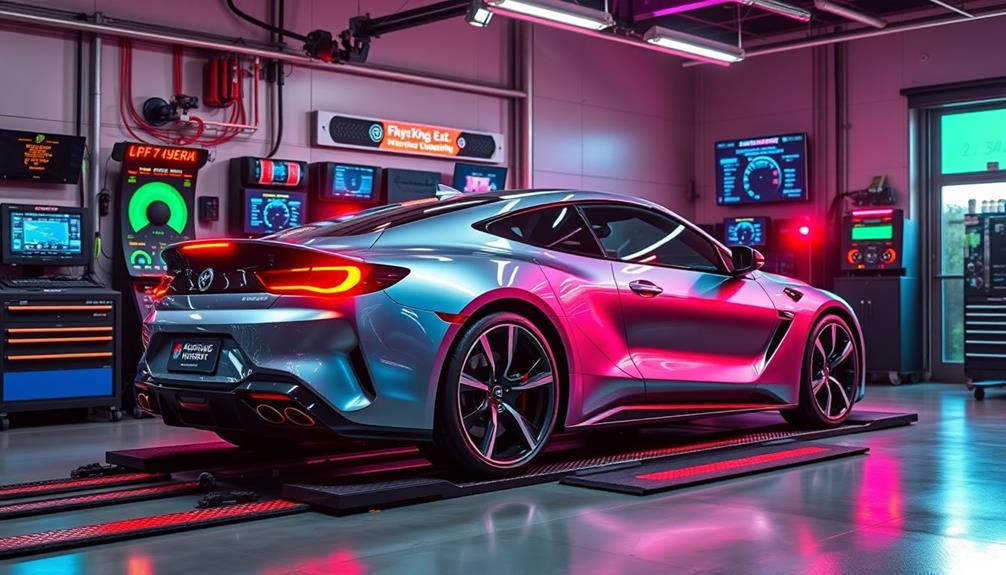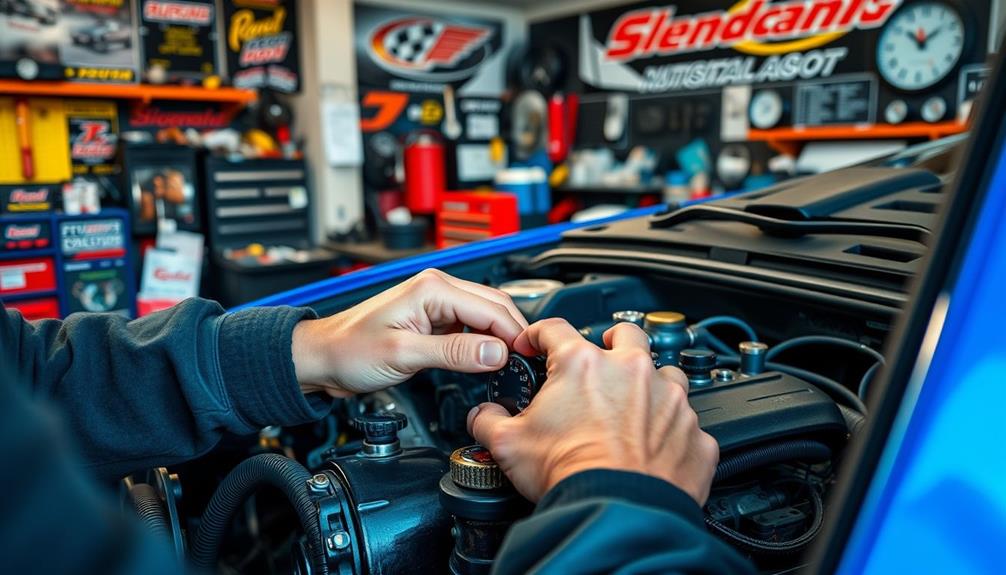Car tuning isn't just a fun pastime; it requires a mix of hands-on experience and theoretical knowledge. You'll face challenges, like diagnosing engine issues and mastering tuning software. To become an expert, you need to spend time learning about automotive principles and practicing with various vehicles. Online courses are available to help you gain skills at your own pace. Networking within the industry is key, connecting you with mentors and job opportunities. While it takes patience and dedication, the rewards of tuning are exhilarating. Stick around, and you'll uncover the steps to building a successful tuning career. Turning your passion for cars into a successful tuning career will also require a willingness to constantly adapt to new technologies and industry trends. It’s important to stay current with the latest advancements in automotive engineering and performance tuning. By staying dedicated and continually honing your skills, you can turn your passion into a fulfilling and lucrative profession in the world of car tuning.
Key Takeaways
- Becoming a tuning expert requires a combination of hands-on experience and self-directed learning, as no formal qualification exists.
- Continuous self-education and practical experience are essential for mastering tuning techniques and problem-solving skills.
- Networking at automotive events and local clubs is vital for job opportunities and mentorship in the tuning community.
- Significant financial investment is necessary to establish a tuning shop, with ongoing operational costs to consider.
- The complexity of diagnosing engine issues and mastering tuning software can present challenges, requiring patience and persistence.
Pathway to Professional Tuning
Starting on a pathway to professional tuning involves a blend of hands-on experience and self-directed learning. Since there's no globally accredited qualification for tuning, you'll need to rely heavily on practical experience and online courses.
These courses, along with personalized lessons, allow you to learn at your own pace, ensuring you grasp the essential skills. Gaining practical experience through projects, even if you start with low-powered vehicles, is key to developing your tuning skills.
Building a portfolio of your work will showcase your abilities to potential employers. Don't underestimate the value of networking; attending local racetracks and automotive events can introduce you to industry professionals who might offer job opportunities or mentorship.
Additionally, consider offering free assistance at established tuning workshops. This not only provides you with hands-on experience but also demonstrates your dedication and skill to those who might hire you in the future.
Starting Your Tuning Career

Starting your tuning career means focusing on essential skills development through hands-on projects and collaborations.
You'll find that networking at events and local shops opens up valuable opportunities and connections.
Gaining practical experience not only builds your confidence but also prepares you for the challenges ahead in the tuning world.
Essential Skills Development
To kick off your tuning career, diving into hands-on experience with different vehicles is crucial. Understanding the intricacies of tuning relies heavily on practical knowledge and the application of tuning principles. Start by volunteering at local tuning workshops or helping friends modify their cars; this indispensable practical experience can help you build a reputable portfolio in the industry.
Structured learning is also essential. Consider enrolling in online courses or seeking mentorship from experienced tuners. Many successful tuners shifted their careers by dedicating time to structured education, which can dramatically enhance your skills.
Don't overlook the importance of continuous self-education. Stay updated on the latest tuning techniques and best practices by reading industry-specific literature and engaging with automotive communities. This commitment to learning will set you apart.
While you're honing your skills, networking is crucial. Attend racetracks and car events to meet other enthusiasts and professionals. Many job opportunities arise from personal connections, which can often lead to indispensable insights and future collaborations.
Networking Opportunities Available
Networking is essential for kickstarting your tuning career, as it opens doors to job opportunities and connections within the automotive community.
Attending automotive events and racetracks is vital; these venues are goldmines for meeting potential employers and fellow enthusiasts who share your passion.
Joining local tuning clubs can also provide invaluable support and mentorship, helping you learn from experienced tuners while exposing you to potential clients and industry insiders.
Don't underestimate the power of volunteering your time. Offering free assistance to established tuning workshops not only showcases your skills but can lead to job openings or collaborations down the line.
Additionally, engaging in online forums like NASIOC or HP Tuners is a fantastic way to share knowledge and network with seasoned tuners.
Practical Experience Importance
Gaining practical experience is key to developing your tuning skills and understanding the intricacies of automotive performance. Hands-on projects with even low-powered vehicles can help you grasp essential tuning principles, making you a more competent tuner.
Volunteering or working at local tuning workshops offers invaluable real-world exposure, allowing you to receive feedback from seasoned tuners who can help refine your techniques.
Engaging in tuning for friends or local car club members builds a reputable portfolio that showcases your abilities. This not only enhances your skills but also attracts potential clients.
Continuous learning is critical; consider enrolling in online courses and applying what you learn in practical settings to reinforce your knowledge and stay updated on industry advancements.
Networking at racetracks and tuning events is also essential. These gatherings can lead to mentorship opportunities and collaborations that are important for your career growth.
Connecting with experienced tuners provides insights that you won't find in textbooks, giving you a competitive edge.
Importance of Practical Experience
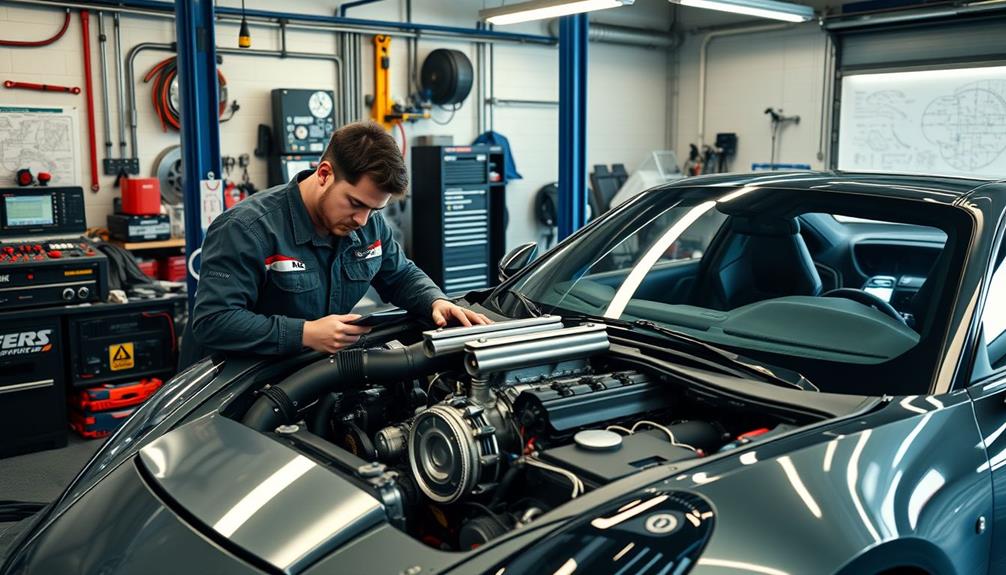
Hands-on experience is essential for mastering car tuning.
When you work on actual projects, you not only apply your theoretical knowledge but also gain confidence in your skills.
Plus, these opportunities often lead to valuable networking with seasoned professionals in the industry.
Hands-on Experience Essential
Practical experience in car tuning is the bridge between theory and real-world application, making it fundamental for anyone serious about mastering the craft. Engaging in hands-on experience allows you to apply your theoretical knowledge directly to vehicles, enhancing your understanding of automotive principles.
Whether you're working on low-powered cars or high-performance machines, these projects help you develop essential tuning skills. Volunteering or working at tuning shops provides invaluable exposure to industry standards, tools, and techniques.
You'll gain practical knowledge through mentorship and direct involvement, which accelerates your skill development. Continuous practice with tuning tools and software is crucial for mastering concepts like real-time data analysis and engine diagnostics, integral to effective tuning.
Don't underestimate the importance of working on your projects consistently. Each attempt refines your techniques and boosts your confidence.
Networking Opportunities Available
Networking is a game changer for anyone looking to excel in car tuning. By connecting with industry professionals at racetracks and automotive events, you gain insights into best practices that can dramatically enhance your skills.
Engaging with local tuning clubs offers shared experiences and access to hands-on projects, which are essential for developing practical tuning skills.
Volunteering at established tuning workshops is another excellent way to gain real-world experience. Offering your assistance not only hones your abilities but can also lead to job opportunities in the field.
Building relationships with experienced tuners is vital; they can provide mentorship that's invaluable for your skill development and understanding of the industry.
Don't overlook online community forums and discussions, either. These platforms foster connections with fellow enthusiasts, giving you access to resources and support for overcoming tuning challenges.
The more you network, the more opportunities you'll encounter that can propel your career forward. By actively engaging in these networking opportunities, you set yourself on the path to becoming a successful tuning expert.
Educational Resources for Tuners
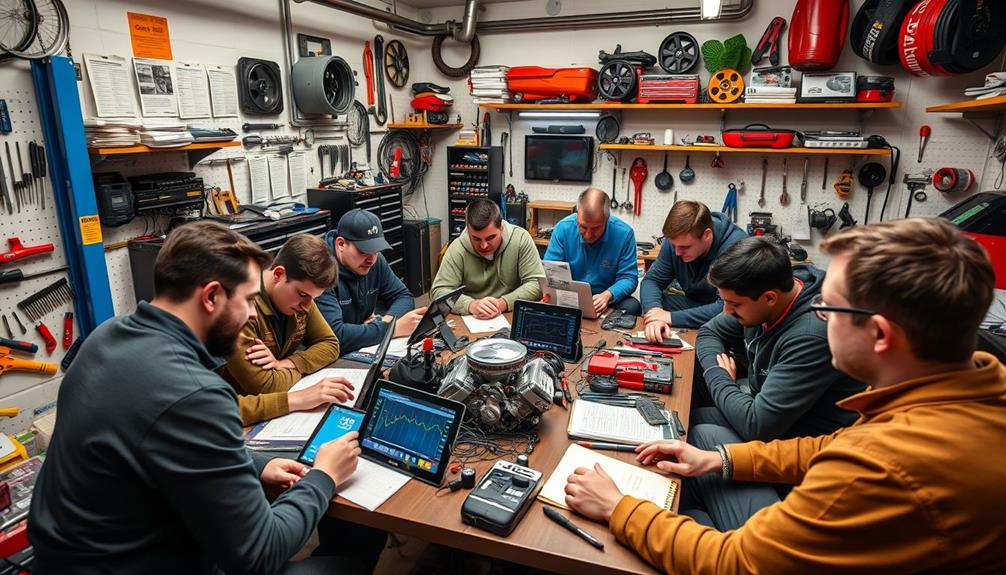
Aspiring tuners need a solid foundation of knowledge to excel in the field, and educational resources play a significant role in that journey. Since there aren't any globally accredited qualifications for professional tuning, online courses and 1-on-1 lessons become essential. These platforms offer structured learning, allowing you to grasp both basic and advanced concepts at your own pace.
In addition to online courses, extensive reading materials, including industry expert books and DVDs, provide invaluable insights into tuning techniques and automotive principles. Engaging with these resources helps you build a strong theoretical background.
However, knowledge alone isn't enough. Practical experience is essential for developing your skills. Working with dynos, volunteering at tuning shops, or participating in hands-on projects can accelerate your learning and deepen your understanding of real-world applications.
Lastly, continuous practice and involvement in community forums can enhance your learning experience. Engaging with others allows for knowledge sharing and support, which is crucial as you refine your tuning expertise.
Community and Networking Opportunities

Building a strong network within the car tuning community is vital for your growth and success. Engaging with local tuning clubs can provide you with valuable support, mentorship, and access to shared resources among enthusiasts and professionals.
These connections can be instrumental as you navigate your tuning journey. Additionally, cultivating a sense of curiosity and happiness through these interactions can lead to more fulfilling experiences and insights in the tuning world.
Networking at racetracks and automotive events is equally important. These settings offer opportunities to meet individuals who can lead to job openings or collaborative projects in the tuning industry.
Don't overlook the power of online forums, like NASIOC for Subaru enthusiasts, where you can participate in discussions, exchange tips, and share experiences with fellow tuners.
Volunteering or assisting at community workshops is another fantastic way to demonstrate your skills while building relationships with established professionals.
Participating in these workshops not only enhances your practical knowledge but also fosters a sense of belonging within the tuning community.
By immersing yourself in these environments, you'll develop connections that can greatly influence your journey as a tuning expert.
Challenges of Tuning

What challenges can you expect when diving into the world of car tuning? The journey is filled with hurdles that can test your patience and skill. You'll quickly realize that tuning isn't just about making your car faster; it's about understanding the intricacies of the engine and the tuning process itself.
Here are some common challenges you might face:
| Challenge | Description |
|---|---|
| Diagnosing Engine Defects | Identifying issues can be complex and time-consuming. |
| Clogged Injectors | Regular maintenance is key to prevent performance drops. |
| Tuning Software | Mastering software tools can be overwhelming for beginners. |
| Dyno Tuning Risks | Improper execution can lead to engine damage. |
As you gain experience, you'll learn that patience is essential. Rushing through adjustments can lead to mistakes and costly failures. Continuous learning through trial and error is vital, and while it can be frustrating, it's part of becoming proficient. Embrace these challenges, and you'll be on your way to tuning success!
Financial Considerations
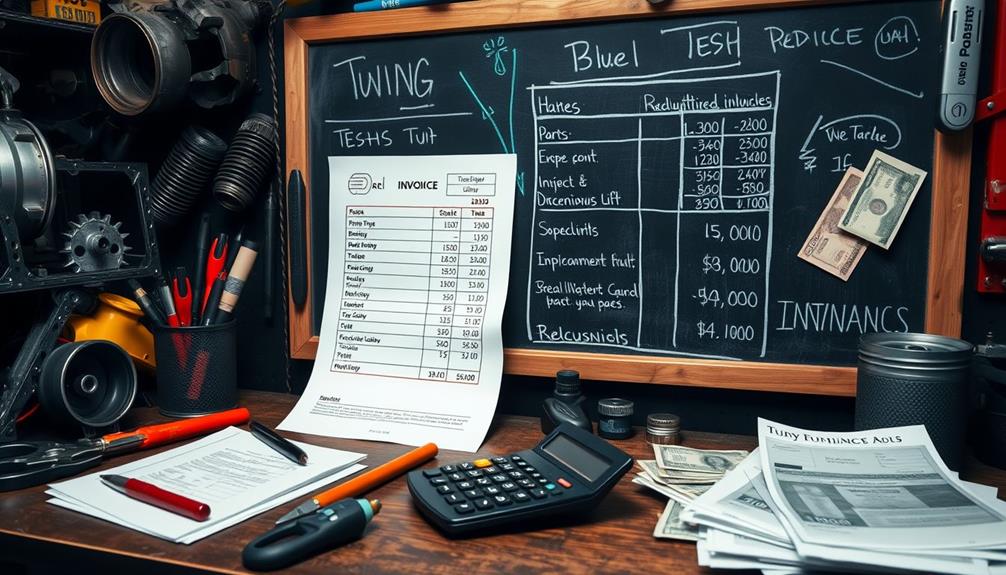
When you consider starting a tuning business, you'll quickly realize that initial investment costs can be substantial.
From specialized equipment to liability insurance, ongoing operational expenses can add up fast, making financial planning essential.
Understanding these costs will help you navigate the complexities of running a successful tuning shop.
Initial Investment Costs
Entering the car tuning industry requires a significant financial commitment, as you'll soon discover the various costs involved. The initial investment costs can be overwhelming. If you aim to become a professional tuner, you'll need to budget for essential equipment and tools.
Setting up a tuning shop often involves spending between $30,000 to $100,000 on dynos alone, not including diagnostic tools and lifts.
Moreover, entry-level tuning software is relatively affordable, costing a few hundred dollars. However, if you want advanced software, expect to pay over $20,000 for packages like SCT dealer software. These expenses add up quickly, making a thorough financial plan vital.
In addition to the tangible costs, consider the ongoing expenses for maintenance and insurance that can strain your budget despite the high service prices you may charge.
Without a solid financial plan that accounts for these initial investment costs, maneuvering the early stages of your tuning business could become a struggle. Prepare yourself and make sure that you're ready to manage these financial demands to establish a successful tuning operation.
Ongoing Operational Expenses
Ongoing operational expenses in the car tuning business can quickly add up, impacting your bottom line. As you dive deeper into this industry, it's vital to understand these costs to maintain profitability.
| Expense Type | Estimated Cost |
|---|---|
| Professional Tuning Services | $650 per service |
| Equipment Costs | $10,000+ |
| Liability Insurance | $1,000/year |
| Software Updates | $500/month |
| Maintenance of Tools | $300/month |
The average cost for professional tuning services alone highlights the financial investment required for quality results. On top of that, equipment costs can accumulate to tens of thousands of dollars. As a shop owner, you might face financial struggles despite high service prices, reflecting the complexities of running a tuning business.
Additionally, liability insurance is essential to cover potential damages during tuning processes, which further adds to your ongoing operational costs. Continuous investment in software updates and maintenance of tuning tools can also lead to additional monthly expenses, influencing your overall profitability. Staying aware of these financial considerations is vital for your success in the tuning industry.
Personal Experiences in Tuning
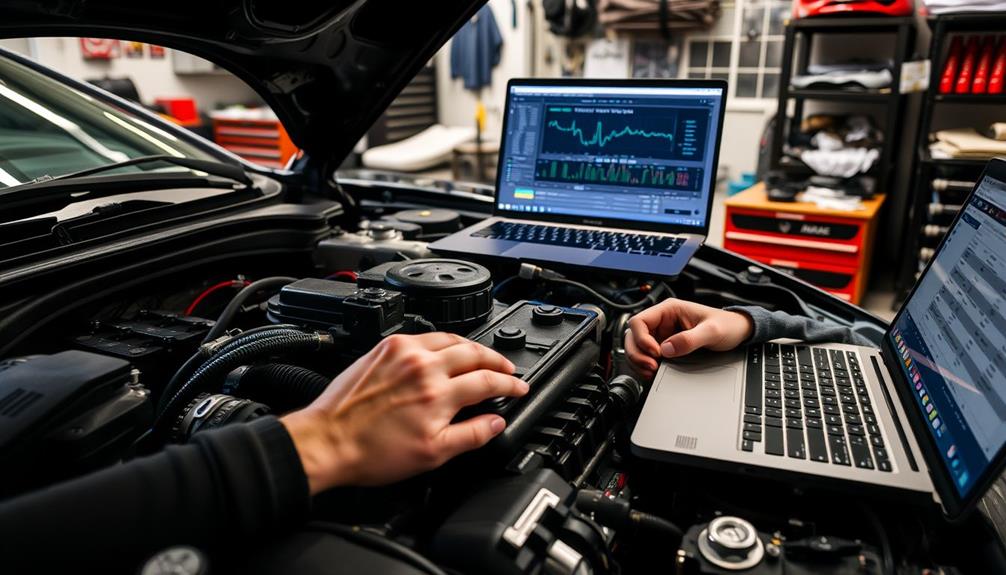
Tuning a car can feel like stepping into a whole new world, filled with excitement and challenges.
You'll likely make mistakes along the way, and that's perfectly normal. Many tuners share that their initial attempts often led to missteps, teaching them the importance of patience and persistence in this journey.
Engaging with the tuning community is essential, as forums and local clubs offer immense support and resources.
You'll find that knowledge sharing among seasoned tuners and novices alike can help you navigate the complexities of tuning. Personal experiences from others can serve as valuable lessons, guiding you through common pitfalls.
If you're a fast learner, you might be tempted to plunge into self-tuning.
Just remember, it's easy to get overwhelmed by the intricacies without proper guidance. But don't let that deter you; tuning can be an addictive pursuit. The thrill of enhancing horsepower and vehicle performance drives many enthusiasts, including you.
Embrace the journey, rely on community support, and learn from both your experiences and those of others.
This way, you'll evolve as a tuner and enjoy every step of the process.
Essential Skills for Tuners

Mastering the essential skills for car tuning can greatly enhance your effectiveness as a tuner. First, you need a thorough understanding of automotive principles, particularly engine mechanics and fuel systems. This knowledge forms the backbone of effective tuning.
Next, practical experience is essential; working with dynos and tuning software allows you to make precise adjustments that optimize vehicle performance.
Familiarity with diagnostic tools is another significant skill. You'll often encounter common issues like engine defects or fuel delivery problems, so being able to troubleshoot these effectively will set you apart.
Continuous learning is important in this fast-evolving field. Enroll in online courses or engage in hands-on projects to master core tuning principles and stay current with industry trends.
Networking with experienced tuners and joining local car clubs can also provide valuable insights and feedback, further facilitating your skill development.
By combining these essential skills—understanding automotive principles, gaining practical experience, using diagnostic tools, and committing to continuous learning—you'll establish a strong foundation for a successful tuning career.
Embrace these elements, and you'll be well on your way to becoming a tuning expert.
The Future of Car Tuning
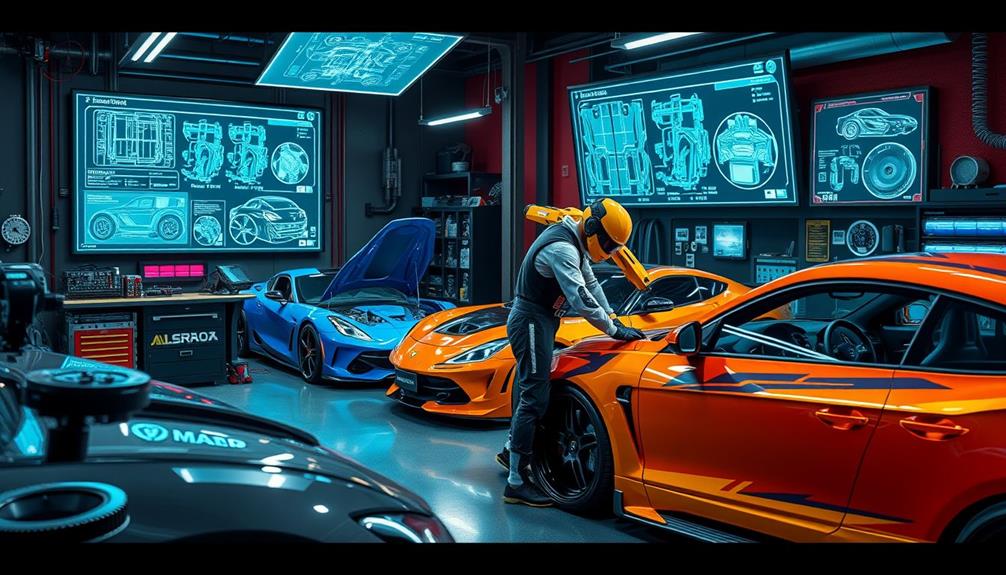
Embracing the rapid evolution of the automotive industry, car tuning is on the brink of transformation. As electric vehicles (EVs) gain traction, traditional internal combustion engine tuning might decline, shifting your focus toward EFI tuning for EV performance enhancements.
Cybersecurity and Ethical Hacking highlight the need for tuners to understand the implications of connected vehicle technology, guaranteeing that their modifications don't inadvertently compromise vehicle security. You'll need to adapt to the growing importance of advanced driver-assistance systems (ADAS), integrating your skills with emerging technologies that enhance vehicle safety and efficiency.
With stricter emissions regulations in place, it's essential to stay informed about legal compliance and eco-friendly tuning practices. This knowledge guarantees your work aligns with industry standards while promoting sustainability.
Moreover, the rise of connected vehicles expands your role, requiring expertise in software and data analytics. You'll find yourself optimizing performance through software updates rather than just mechanical modifications.
Online communities and forums will continue to be invaluable resources, allowing you to collaborate and share innovative techniques with fellow tuners.
Frequently Asked Questions
Is It Hard to Learn to Tune a Car?
Learning to tune a car can be tough. You'll need to grasp complex concepts, gain practical experience, and tackle common issues. With patience, practice, and guidance, you'll build the skills necessary for success.
How to Become a Professional Car Tuner?
To become a professional car tuner, start by tuning a friend's car. Gain hands-on experience, take online courses, and network at events. Volunteer at workshops to build skills and establish connections in the industry.
Do Car Tuners Make Good Money?
Yes, car tuners can make good money. With experience and specialization, you can charge high hourly rates. Building a loyal client base and offering workshops can further increase your earnings, making it a lucrative career choice.
Are Car Tuners in Demand?
Car tuners are in skyrocketing demand! As vehicle owners crave performance and efficiency, your tuning skills can open doors. Networking in car clubs and events can lead to exciting job opportunities and collaborations. Don't miss out!
Conclusion
In the dynamic world of car tuning, dedication and determination drive success. By diving into practical experiences, you'll develop dazzling skills and build a robust network of like-minded enthusiasts. Embrace educational opportunities and tackle financial factors to fuel your journey. Remember, every expert started as a novice, so don't hesitate to take the plunge. With passion and persistence, you can transform your tuning dreams into a thrilling reality, steering yourself toward a bright automotive future.

